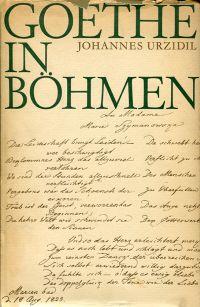In 1821, Johann Wolfgang von Goethe planned to visit his hometown Frankfurt am Main and the Rhine valley. After the death of his wife Christiane five years earlier, he hadn’t undertaken any visits far away from home, and his trip to Karlsbad and Marienbad 1820 was for medical reasons. Since Goethe was not in good health then, his doctors prescribed the mineral water of the Bohemian spas which had done the poet and statesman well on prior occasions. A bout of illness prevented the planned meeting with old friends in the West, and the by then 72 year-old Goethe followed the medical advice to go again to Marienbad.
The small book “Goethes späte Liebe” (Goethe’s late love) by Dagmar von Gersdorff recounts what happened in Marienbad. Goethe arrived in Marienbad in good spirits; he was additionally lucky to meet an old acquaintance, the attractive Amalie von Levetzow, an energetic woman in her early thirties, twice divorced, and owner of a representative villa she rented out to guests from the aristocracy and high society. Amalie had married very early and had three daughters; the oldest one, Ulrike, then a 17-year old teenager, caught immediately Goethe’s eye.

Ulrike von Levetzow, 1821 – Pastel by an unknown painter
Ulrike, who was attending a boarding school in France where she got a French education, had never heard of Goethe, and had therefore in the beginning no idea that the old gentleman she met was Germany’s most important poet and at the same time Head of the Government of the small Grand-Duchy Sachsen-Weimar-Eisenach – the Grand-Duke was also an old friend of her mother Amalie. Goethe took no offence and was obviously in the contrary smitten by the natural friendliness and attentiveness of the girl. Soon they went out for walks together, with Goethe introducing many to the girl new topics that covered a wide range of subjects (astronomy, geology, mineralogy, botany, but of course also poetry and literature). In the evening they would sit together on a bench in front of the villa talking vividly, reading or discussing copper plates Goethe had ordered. Also the younger sisters were involved, Goethe attended picnics and dinner invitations with them, danced and had fun.
While Ulrike’s family treated Goethe like a family member, it was for most people in Marienbad a source for permanent gossip to see the transformation of Goethe. While at the arrival he made the impression of an old sick man, he was soon bursting with energy and was visibly rejuvenated; the reason for this transformation was easy to guess. Soon the gossip reached also Weimar, and Goethe’s son August and his wife Ottilie, who lived with their children in Goethe’s house in Weimar were not exactly delighted about the news. But once the summer was over, and Goethe went back to Weimar, things calmed down again, but from letters to his friend Zelter we know that Goethe felt the contrast between the cheerful atmosphere in Marienbad and the cold reception at home by his son and daughter-in-law as rather depressing.
Goethe spent also the summer of 1822, and then again the summer of 1823 in Marienbad. It seems that in 1822, his feelings for Ulrike became so serious that he considered a marriage proposal, despite the age gap of 55 years. When it became obvious to his surrounding, that the old man was serious, tout Weimar was bursting with gossip about this scandal. Schiller’s widow, the Humboldt’s, even Wilhelm Grimm, or Bettine von Arnim from Berlin were sending letters back and forth in which they secretly scolded the foolishness of Goethe. It was not the first time Goethe faced this kind of situation. Similar scandals followed his early relationship with Frau von Stein, and his running away to Italy for two years, leaving behind important state business and a whole town wondering what happened to their most prominent inhabitant (after the Grand Duke, Goethe’s old friend and protector); the small town of Weimar also didn’t accept the fact that Goethe lived for many years with Christiane Vulpius, a woman who was considered as socially inferior, a mesalliance – and on top of it they were not even married! Goethe seem not to have cared very much for gossip, but this time things were different.
August and Ottilie threatened Goethe to desert him and leave, together with their children – if a young woman would enter the house as Goethe’s wife; especially the danger not to see his beloved grandchildren any more was a heavy burden on Goethe’s soul. When the Grand Duke travelled to Marienbad to visit the von Levetzow family and to submit on Goethe’s behalf a marriage proposal, the house at the Frauenplan was almost in a state of war. Cold and harsh were the words August and Ottilie exchanged with Goethe, and he started to feel like a stranger in his own house. Meanwhile, the Grand Duke had not only submitted Goethe’s marriage proposal, he had also explained that in the case Ulrike would live in Weimar, also a house for her family would be built by the Grand Duke; Ulrike would be the First Lady at the court of the Grand Duke; she would receive a generous livelong pension and would be treated like royalty in every respect. Ulrike’s mother made it clear that she would not interfere in her daughter’s decision; while she was very sceptical because of the age gap, it was clear that the proposal was also an honor. Ulrike declined, especially since she sensed that this would affect the peace in the house of Goethe. And of course, we might say, her feelings were very different from that of Goethe.
Ulrike von Levetzow lived until 1899; in that moment she was the last person that knew Goethe personally. She never married, although she received many marriage proposals. A few years before her death, she wrote down a text in which she gave her side of the story. It was no love affair, she claims. Goethe was like a grandfather, a sweet, good-natured man, educating her on many subjects; and he saw in her only a daughter (or grand-daughter). She plays down the seriousness of the matter, but for Goethe, it was definitely much more. What exactly happened between them, we don’t know; they kissed at least on one occasion; and how explicit Goethe made his wish to marry her in his conversations with her, we can only guess. While the decline of the marriage proposal was never formally voiced, Goethe still had hopes, a fact that is also very clear from his correspondence with the girl’s mother. But when in October 1824, Ulrike and her mother were passing by Weimar without stopping to meet Goethe (whom they even saw on the street), we can easily guess that the old man was heartbroken. Still, he kept the correspondence going, and even shortly before his death his thoughts were with Ulrike as we know from letters.
It was an impossible love, no doubt. And deep inside, we can be sure that Goethe knew it. But still, this love brought him new energy and inspiration and the Marienbad Elegy, probably the most beautiful of his later works is one of the results of this love of an old man to a young girl.
The last stanza goes like this:
Mir ist das All, ich bin mir selbst verloren,
Der ich noch erst den Göttern Liebling war;
Sie prüften mich, verliehen mir Pandoren,
So reich an Gütern, reicher an Gefahr;
Sie drängten mich zum gabeseligen Munde,
Sie trennen mich, und richten mich zugrunde.(To me is all, I to myself am lost,
Who the immortals’ fav’rite erst was thought;
They, tempting, sent Pandoras to my cost,
So rich in wealth, with danger far more fraught;
They urged me to those lips, with rapture crown’d,
Deserted me, and hurl’d me to the ground.)(translation by Edgar Alfred Bowring)

Dagmar von Gersdorff: Goethes späte Liebe, Insel Verlag Frankfurt am Main und Leipzig 2005

A classic that covers the same period of time:
Johannes Urzidil: Goethe in Böhmen, Zürich: Artemis, 1962 (1935)
© Thomas Hübner and mytwostotinki.com, 2014-8. Unauthorized use and/or duplication of this material without expressed and written permission from this blog’s author and/or owner is strictly prohibited. Excerpts and links may be used, provided that full and clear credit is given to Thomas Hübner and mytwostotinki.com with appropriate and specific direction to the original content.





 Facebook
Facebook RSS
RSS Twitter
Twitter